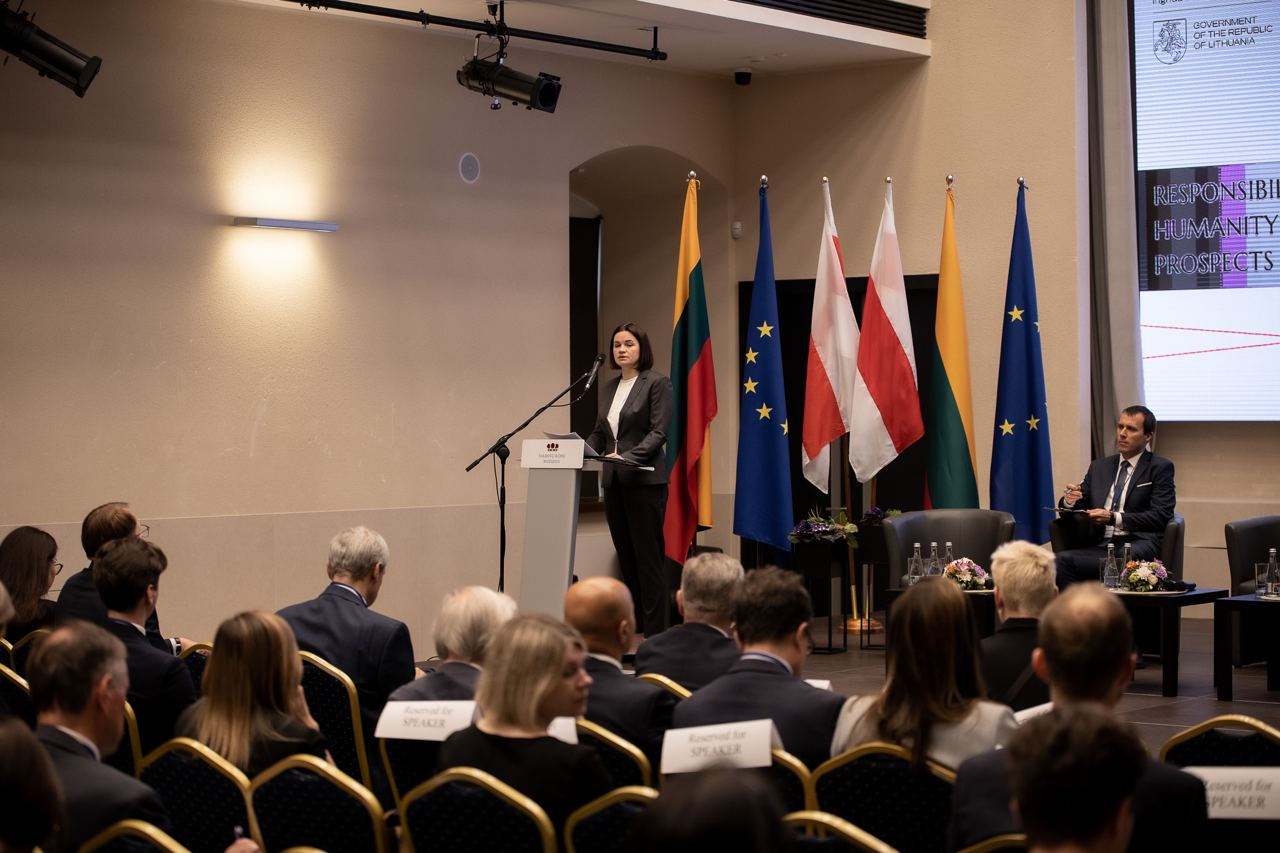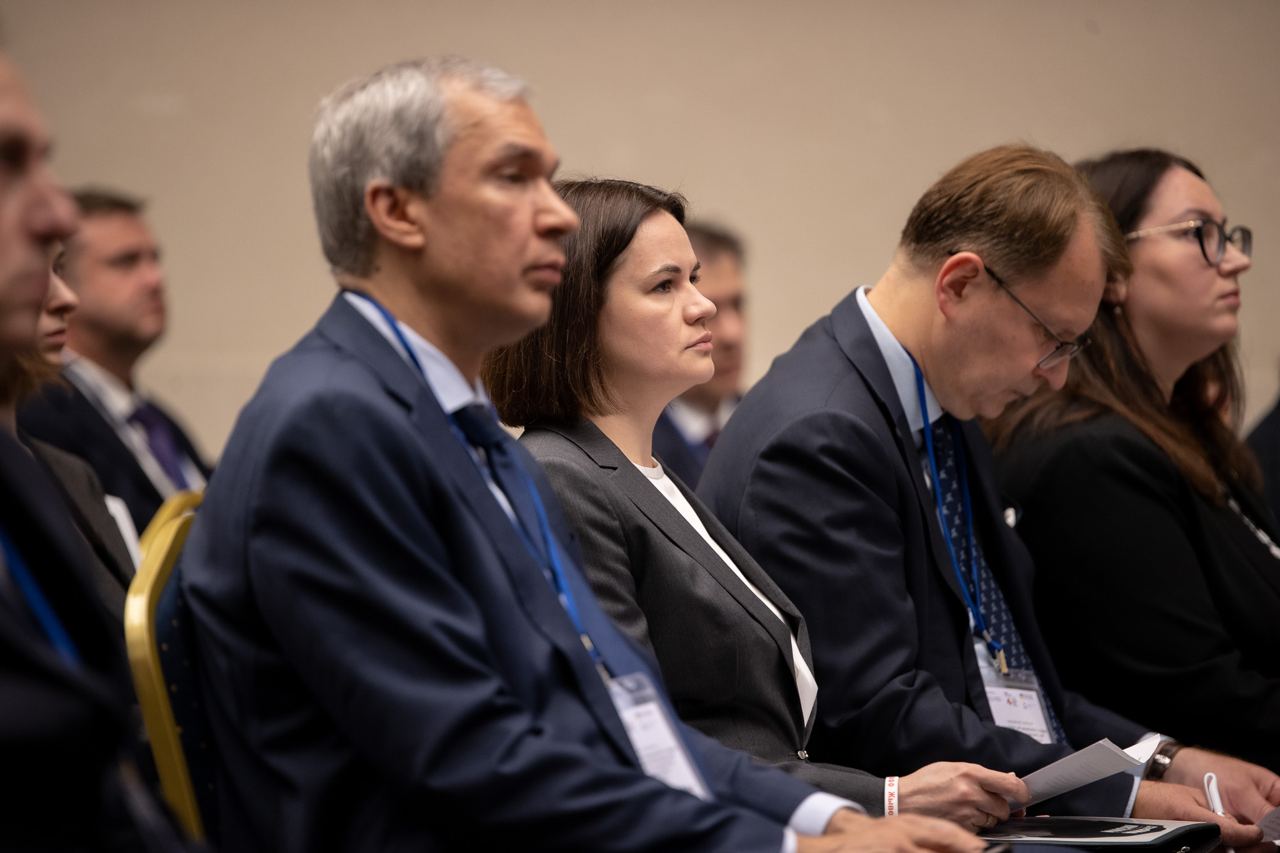“Ms. Ewelina Dobrowolska,
Ms. Anaïs Marin,
Mr. Dainius Žalimas,
Ladies and gentlemen,
In the first place, let me thank Lithuanian Ministry of Justice, and the Law and Democracy Center for organizing this conference.
This conference is another step in restoring justice in Belarus. To restore justice, we need not only to release all political prisoners and conduct free and fair elections, but all those who committed crimes must be held accountable.
Lukashenka’s regime has a long record of crimes since 1994: abuse of power, falsified elections, hijacking of flight, crimes against humanity and crimes of aggression, extra-judicial killings of political opponents.
We know the crimes, but we lack mechanisms to keep the regime accountable. Hopefully, the experts who gathered here will help us to find the solutions.
After the 2020 presidential campaign, Belarus found itself in the situation of a legal default. In response to the peaceful and legal protest of Belarusians, the regime responded with terror. Neither national legislation nor international laws could longer protect Belarusians. Courts have become punitive bodies, and prisons have become torture chambers.
It became obvious that Lukashenka would do anything for his political survival, including crimes against humanity. That was the highest level of violence not only in the history of Belarus, but in the history of Europe since the beginning of this century.
Only in the first 3 days after the 2020 elections, about 7,000 citizens were detained. Almost every one of them was subjected to torture. People suffered from stun grenades’ explosions and bullet wounds. Many were forced to kneel for a long time. Women and seniors were deprived of water and kept in overcrowded and stuffy cells. Many were beaten. Girls were threatened with sexual violence. Several people were raped.
Obviously, the regime itself took no steps to investigate politically motivated violence, murders and torture. Instead, many people who tried to sue police for torture were prosecuted themselves. Criminal charges were brought against them, for example, for participating in mass riots.
The brutality of the regime was documented by UN Special rapporteur Anaïs Marin in her multiple reports. Also the OSCE twice initiated the Moscow mechanism against the regime. Based on its recommendations, the International Platform for accountability for Belarus was created. The Platform was joined by Belarusian human rights defenders and their partners from various countries.
The platform has already collected information on more than a thousand victims and witnesses of alleged crimes. There are over a hundred thousand videos, over 300,000 pictures and texts from 418 public sources – more than 700,000 materials in total. Сertainly, these materials will be an important basis for bringing the regime to justice. But even they do not reflect the full scale of terror.
After the beginning of Russia’s aggression against Ukraine, repressions against Belarusians have even intensified. Lukashenka’s regime feels that the world's attention is on Ukraine, which allows it to continue its crimes. 10-20 people are being illegally detained daily. Judges continue to pass unlawful sentences. Even a post on social media can be now qualified as terrorism.
In March 2023, Belarusians learned what “incommunicado” means. For example, I did not hear from my husband Siarhei, for three months already. It is the regime’s new tactic of repression. Many political prisoners are totally cut off from the outside world, they have no legal assistance.
Not only Belarusians are those who suffer. Thousands of migrants brought by the regime to the Polish and Lithuanian border are used to destabilize the situation in neighboring countries. The regime demonstrates total disrespect for international law and human life.
The international community has repeatedly emphasized the criminal nature of the regime. I welcome the resolution of the Lithuanian Seimas which proposed to create a special International tribunal for crimes against humanity, committed by the regime. This resolution also suggests bringing to justice the highest political and military leadership of Belarus for the coaggression against Ukraine. In January, the European Parliament adopted a similar resolution. Among our Western friends, the topic of regime accountability is becoming increasingly important.
Recently, we saw another line of criminal activity of Lukashenka. My deputy Pavel Latushka and National Anti-Crisis Management have collected evidence showing that top Belarusian officials were involved in unlawful transfers of Ukrainian orphans to Belarusian territory. This information must be diligently studied and legally evaluated.
Dear friends,
Our goal and our priority must be to restore justice in Belarus. I am confident that changes in Belarus will come, and we must be ready for them. We have to prepare and adapt Belarusian national legislation on prosecuting crimes against humanity.
However, at this very moment, we must explore existing mechanisms to bring the dictator and his accomplices to justice. There are a few of them: universal jurisdiction, special tribunals, and special regional tribunals; International Court of Justice and the International Criminal Court, like in the case of illegal transfers of Ukrainian children.
I ask you to pay special attention to universal jurisdiction. It allows states to prosecute crimes committed in other countries and by foreign citizens. The use of Universal Jurisdiction was endorsed by the PACE in 2021. Member-states of the Council of Europe can open cases for human rights abuses, even when the perpetrator is not on their territory.
Some cases prosecuting torture in Belarus have already been initiated in Lithuania and Poland. Attempts are being made to initiate similar cases in the Czech Republic and Germany.
Unfortunately, the progress in such cases is very limited. Decisions on such cases are made very slowly. Sometimes, it happens because of national legislation’s peculiarities. Sometimes, investigators lack data on people who have committed the crimes. To push these cases, we need a political will, but also cooperation between investigators and human rights defenders with access to data.
Unfortunately, we also have no significant progress with ICC. To launch an investigation, we need the decision of the ICC prosecutor. Launching through the Security Council is unlikely as long as China and Russia have veto power there.
The regime sees that the existing mechanisms don’t work. It gives it the feeling of impunity, and the regime only intensifies the repressions.
That is why we all need to think: how do we bring to justice those responsible for crimes against humanity and other crimes, including crimes of aggression and war crimes? We need to come up with a clear strategy.
I understand that this is not an easy task. But I hope that on this high-level platform we will be able to come closer to the moment when the main perpetrators will be brought to a fair trial.
Thank you for your attention”.









